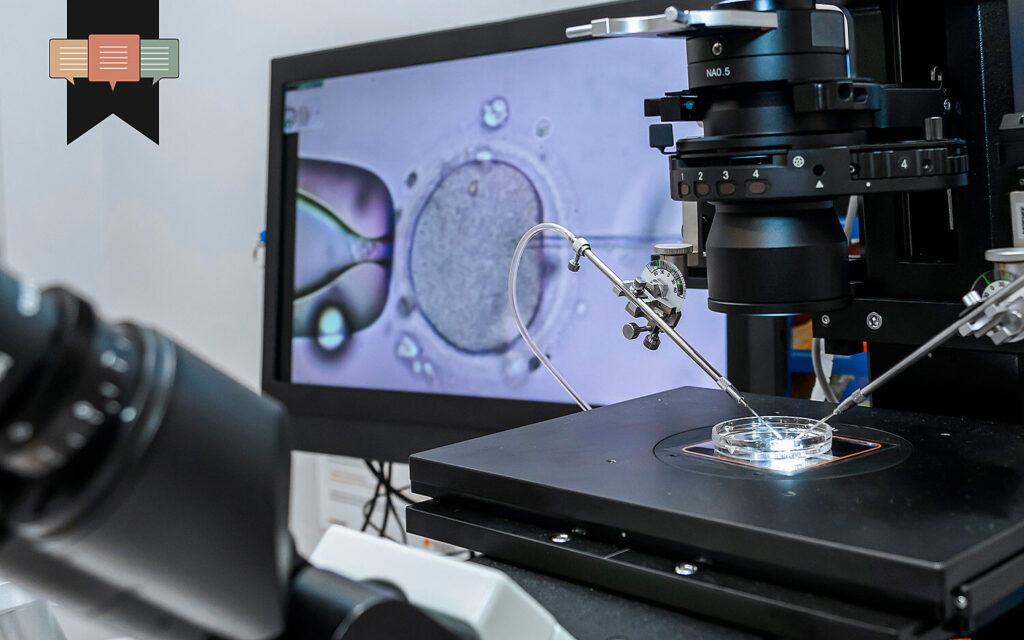
Published June 22, 2023
In May, The Guardian reported the sensational news that the world’s first “three-parent babies” had been born, combining the DNA from one father and two mothers. The procedure, known as mitochondrial donation treatment, or MDT, is an attempt to prevent certain genetic disorders stemming from mutations in the mother’s mitochondrial DNA.
The scientists on the project were quick to reassure the public that the term “three-parent baby” was misleading, since 99.8 percent of the DNA was from the two primary parents, but this is a bit like a husband telling his wife he has been “99.8 percent faithful” because he only slept with his secretary twice. They needn’t have worried, though, for the headline caused barely a ripple in the news cycle.
One can just about remember when conservatives were up in arms about the book Heather Has Two Mommies, celebrating a lesbian couple. But why? Many had already accepted that Heather could have two mommies and one daddy through in vitro fertilization (IVF), and, decades earlier, that she could have two daddies and one mommy through artificial insemination (AID). By moving from two genetic parents plus one physiological parent to three genetic parents, MDT is simply the next logical step in our decades-long endeavor to detach procreation from sex.
But it is not too late to stop and ponder the meaning of such actions.
For such pondering, there are few better guides than a four-decade old masterpiece by Christian ethicist Oliver O’Donovan, Begotten or Made, recently republished in a new American edition. In it, O’Donovan invites us to ponder the profound distinction between the idea of begetting a child—the fruition of the body’s natural powers that nonetheless always carries a hint of the miraculous—and of making a child, as an achievement of human will made possible by vast advances in technique.
“If talk of ‘making’ our progeny fails in any way,” he admonishes, “it fails only by falling short of this unplumbed chasm that has opened up in our experience of what it is to be human, a work of technique before which understanding is numb.” Once we have crossed this chasm, he observes, “there is no knowing what a parent is.” Indeed, it will become increasingly difficult to know what a human is, or to retain the reverence for human life that the Christian tradition has instilled in us, for whatever we make, we ordinarily have the right to unmake.
Many may be quick to object that the new therapy is an attempt to serve the proper purpose of medicine by preventing fatal genetic disorders. But there is far more to this moral quagmire. We do not want babies to be born with such diseases, nor mothers to be consumed with fear for the children they are bearing, but sympathy is never in itself a sufficient justification for unethical medical technologies. Some bridges should not be crossed.
Unlike adoption—a service of charity to nurture and rear a child with two unambiguous parents—procedures like AID, IVF, and MDT all irrevocably blur the lines of parenthood, and with it, the nature and purpose of sexuality. O’Donovan observes, “when procreation is divorced from its context in man-woman relationship, it becomes a project of marriage rather than its intrinsic good; the means to procreation become the instrumental means chosen by the will, rather than themselves being of the goods of marriage.”
Once this happens, it becomes difficult to see marriage as anything more than a loving union of two wills for mutual comfort, and thus very difficult to explain why the pesky biological details of maleness or femaleness should make any difference when it comes to whom we allow to marry.
These procedures also blur the boundaries between public and private, making it increasingly difficult to sustain the solemnity and intimacy of the sexual act. They invite a third party into the bedroom, as it were, to aid in the business of procreation, imagining that a simple contract specifying genetic ownership will clear up all difficulties. In other areas of life, another can stand in for me or stand alongside me if I need help, but in this? “A friend may guide my hand upon the saw while I try to build a bookcase,” remarks O’Donovan, “but who may guide my hand while I embrace my wife?”
When it comes to technology, our default assumption is that if we can do something, then we should. This is exactly how Satan tempted Eve in the beginning. But we should aspire that future generations remember us more for the things we chose not to do than for the new opportunities we casually embraced.
Brad Littlejohn (Ph.D., University of Edinburgh) is the founder and president of the Davenant Institute. He also works as a fellow at the Ethics and Public Policy Center and has taught for several institutions, including Moody Bible Institute–Spokane, Bethlehem College and Seminary, and Patrick Henry College. He is recognized as a leading scholar of the English theologian Richard Hooker and has published and lectured extensively in the fields of Reformation history, Christian ethics, and political theology. He lives in Landrum, S.C., with his wife, Rachel, and four children.
Brad Littlejohn, Ph.D., is a Fellow in EPPC’s Evangelicals in Civic Life Program, where his work focuses on helping public leaders understand the intellectual and historical foundations of our current breakdown of public trust, social cohesion, and sound governance. His research investigates shifting understandings of the nature of freedom and authority, and how a more full-orbed conception of freedom, rooted in the Christian tradition, can inform policy that respects both the dignity of the individual and the urgency of the common good. He also serves as President of the Davenant Institute.









